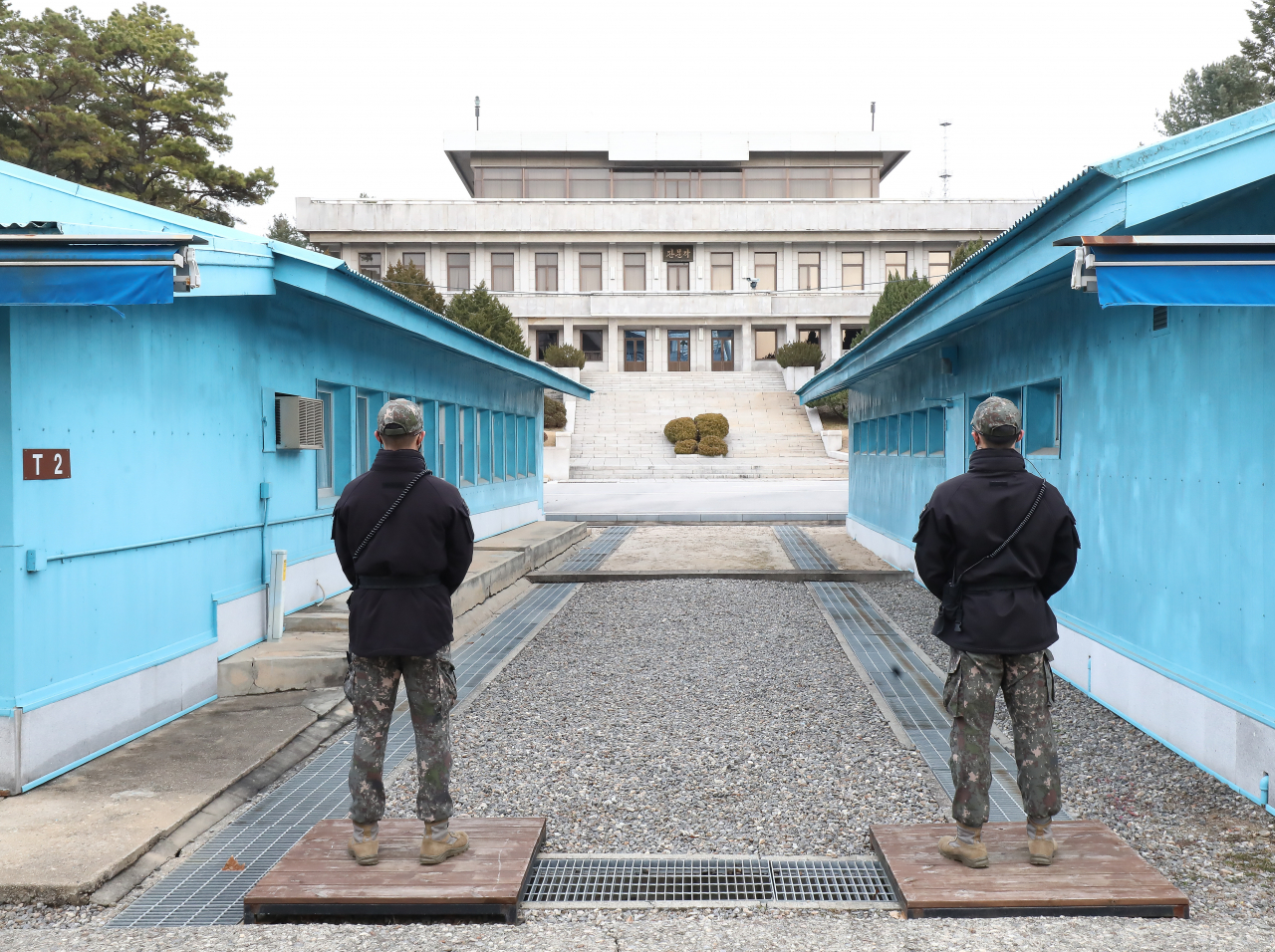South Korea warns tit-for-tat action over North Korea’s border buildup
By Kim ArinPublished : Nov. 28, 2023 - 18:20

Adding to renewed tensions between the two Koreas, North Korean soldiers guarding the truce village appeared armed Tuesday, as Seoul expressed its willingness to reciprocate Pyongyang’s redeployment of surveillance posts and heavy weapons along the shared border.
Reports said Tuesday that North Korean soldiers stationed in the Joint Security Area were armed with pistols, in the latest in a string of moves by Pyongyang to resume military activities paused by the 2018 inter-Korean agreement aimed at lowering tensions on the front lines.
In an address Tuesday, President Yoon Suk Yeol said North Korea was trying to undermine South Korea’s ability to work with allies and partners, while defending its regime with missiles and nuclear weapons.
Kim Tae-hyo, the South’s principal deputy national security adviser, said during his appearance on public broadcaster KBS’ late-night news Monday that South Korea “could not stand by idly” while “the other side is watching us closely from guard posts, all armed and posing threats.”
“We’ll see how things develop. I think it’s not out of line for us to take reciprocal actions,” he said.
His remarks came in response to a question from the news show’s presenter, asking if Seoul had plans to rebuild its own border guard posts as its neighbor has been doing.
The national security adviser said Seoul wasn’t thinking of following suit in calling off the entire 2018 inter-Korean agreement after Pyongyang’s one-sided withdrawal from the deal last week. “North Korea has already been repeatedly and intentionally violating terms of the agreement, and I see no need for our government to take additional actions,” he said.
North Korea said on Nov. 23 that it was pulling out of the agreement, reached in 2018 during a period of reconciliation under the last President Moon Jae-in to prevent a military confrontation close to the border. In announcing the withdrawal, Pyongyang accused Seoul of scrapping the agreement first.
The previous day, Nov. 22, South Korea had said it would suspend parts of the agreement that would allow restoration of front-line surveillance one day after North Korea launched a military reconnaissance satellite on Nov. 21, violating United Nations bans.
Seoul’s Ministry of National Defense spokesperson Jeon Ha-kyu similarly warned of “measures of reciprocity” in a regular press briefing on Monday. “We’ll be keeping our eyes on North Korea’s moves along the front lines, and take corresponding steps,” he said.
The Defense Ministry said that North Korea has begun to reconstruct its formerly demolished guard posts, as well as station troops and weapons around the border.
Shin Won-shik, the South Korean minister of national defense in Seoul, visited Monday the South Korea-US Combined Forces Command in Camp Humphreys to speak with Gen. Paul LaCamera, the commander of the CFC, US Forces Korea and the UN Command.
Over the visit, Shin called for a strong combined defense posture against North Korea’s provocations, including the spy satellite launch, and moves to redeploy troops and arms near the border.
The National Intelligence Service in Seoul convened a meeting of senior officials early Tuesday to "thoroughly prepare for any possible military provocations from North Korea, such as its heavy arming along the border and installation of surveillance posts," the intel service said in a statement. "The NIS will quickly respond to security threats arising from the Hamas-Israel war and other ongoing developments," it said.
North Korea has rejected criticisms of violating relevant UN Security Council resolutions with its satellite launch, saying it was an act of self-defense.
North Korea’s Ambassador to the UN Kim Song said at a UN Security Council meeting on Monday that the US and its allies’ condemnation of the satellite launch was “a blatant violation of North Korea’s sovereignty and an instance of serious meddling into its internal affairs.”
“Currently there are more than 500 satellites orbiting the Earth, and the Security Council is taking issue with the ones launched by the DPRK only,” the North Korean ambassador said. DPRK stands for the North’s official name, the Democratic People’s Republic of Korea.
The Nov. 23 statement carried by the KCNA characterized the satellite launch as a “legitimate exercise” of North Korea’s “sovereign right to self-defense” to monitor military actions being taken by enemies around the Korean Peninsula.
In the statement, North Korea said the 2018 inter-Korean deal “has long been defunct” while at the same time warning South Korea will be made to pay a “hefty price” for declaring a partial suspension.
North Korea claims that its military reconnaissance satellite, the first one to be put into space after two failures earlier this year, has taken images of the White House and the Pentagon.
The North’s state-run Korean Central News Agency said Tuesday that leader Kim Jong-un had reviewed satellite images of the White House and the Pentagon taken at 11:36 p.m. Monday.
A State Department spokesperson in Washington said North Korea’s recent actions along its border with the South were heightening military risks.
“The actions that the DPRK is taking along the DMZ following its abrogation of the (agreement) are increasing the risk of military tensions and miscalculations on the Korean Peninsula,” the spokesperson told Yonhap News Agency.
Khaled Khiari, the UN’s assistant secretary-general for the Middle East, Asia and the Pacific, pointed out non-military risks posed by North Korea’s launch, namely those regarding international aviation and maritime traffic.
“While the DPRK issued a prelaunch notification to the Japanese Coast Guard, it did not issue airspace or maritime safety notifications to the International Maritime Organization, the International Civil Aviation Organization or the International Telecommunications Union,” he said.



















![[Today’s K-pop] Treasure to publish magazine for debut anniversary](http://res.heraldm.com/phpwas/restmb_idxmake.php?idx=642&simg=/content/image/2024/07/26/20240726050551_0.jpg&u=)